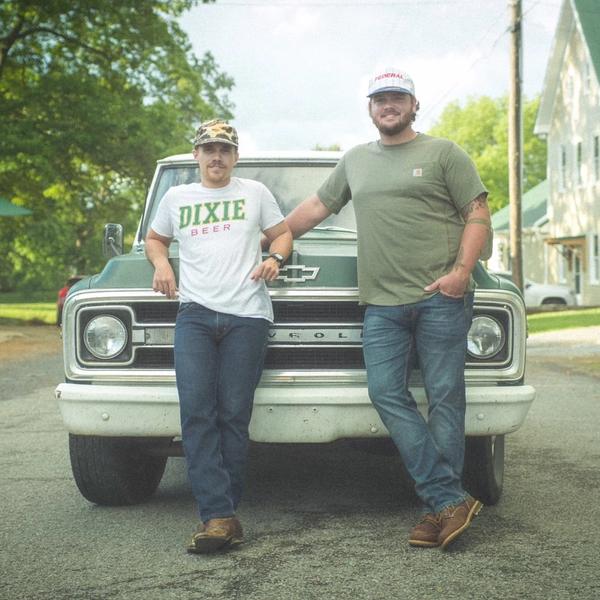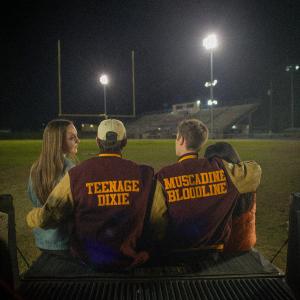




Link copied

Muscadine Bloodline’s Charlie Muncaster and Gary Stanton wear their Alabama heritage loud and proud on their third studio album, Teenage Dixie. Produced by the pair alongside Ryan Youmans, the compelling 16-song record is filled with both folklore and true-to-life stories about their hometown of Mobile, AL.
Dubbed the City of Six Flags because of its historical rulings, Mobile is one of the oldest towns in the United States and the home of Mardi Gras.
“It’s got this cool culture that’s not like anything else, kind of like New Orleans,” Stanton explains. “It’s a town in the south and when you think country, it’s got it. But it’s also got awesome seafood and its own music scene. They like roots music a lot. It’s not a marquee town, but it’s got its own culture that you can appreciate.”
Though the duo has been making music for eight years, it wasn’t until recently that they decided to revisit their roots, make a “dixie”-defining record and showcase to the world the small-town shenanigans and southern hospitality of Alabama. The result of this vision is an imagery-rich collection that paints vivid visuals of the Cotton State through pointed and authentic storytelling.
‘Me on You’ chronicles an all-American love tale, ‘Old Man Gillich’ introduces the life of notorious Dixie Mafia founder Mike Gillich, ‘Pocket of 90’s Country’ pays homage to Muscadine Bloodline’s love for nostalgia and the fiery ‘Devil Died in Dixie’ is an inventive follow-up to the Charlie Daniels Band’s ‘The Devil Went Down to Georgia.’
We joined Muscadine Bloodline from their home in Nashville to chat about their Alabama roots and how it’s shaped their remarkable new record, Teenage Dixie.
What is the first venue you performed at in Mobile?
Charlie: Soul Kitchen! It’s a music venue. They probably only have one or two shows a week. They’re really particular. My mom actually babysat the owner of the bar and that’s the only reason I got to play there to meet Gary. Shout out mom for babysitting Brad Young! That’s another funny part of the story we don’t tell very often.
Do you have a favorite hometown restaurant?
Gary: I got a couple. One is a seafood place called Kravers, shout out to my buddy C.W. Kraver who owns it. It’s awesome. They get all the seafood right there in the bay and what’s caught that morning is right on the plate that day. There’s also another stop I grew up going to called Big Time Diner, and it’s your atypical 1960s, 1970s loosely-themed southern-style cooking.
Charlie: Another quick one is a chicken finger chain in Mobile called Foosackly’s. It’s just kind of like your Zaxby’s or Raising Cane’s, but it’s our hometown thing. There’s one down the street from my house that my buddy and I used to walk to for chicken fingers!
What should one have on their itinerary for a day trip to Mobile?
Gary: Mardi Gras started in Mobile! So I’d say if they come for a day, they should come in late February, go for the Mardi Gras parade, and if just so happens to be hot, head out to golfing island or go across the bay. People call it “the good side of the bay.”
There’s a beautiful little town called Fairhope, that’s worth the 20-minute drive to go down there. And you’re only 45 minutes from Orange Beach or Gulf Shores, which are marquee vacation spots for a lot of people. It’s got beautiful white sand and everything! So, go get some really good seafood, go get some Oysters at Wintzell's, drink somewhere in the downtown area and catch a Mardi Gras parade.
Charlie: I think, too, if you’re a history buff, there are some old Forts down there that were on the coast, and there’s the USS Alabama battleship in the base as well. It’s worth seeing at least once.
Why did you guys decide to highlight your hometown roots on your third album after making music for so long?
Gary: It took us upwards of six years and honestly, with the pandemic pulling us off the road, we got out of the typical write song, record, put out records and tour cycle. There wasn’t a lot of living being done at that time because we were just trying to keep this thing rolling as an independent band. Instead of “man, we’ve got to play shows and have some music out,” it was more of being intentional with what we were trying to say and convey.
Honestly, it’s made it the most fun it’s ever been. Covid was a terrible time, but it was a blessing for us to be able to sit back and reflect on who we’re trying to be and what stamp we’re trying to put on country music. We found ourselves listening to songs from the 90s and these great songwriters from the 70s and 60s. That’s what we always go back and listen to, so why isn’t our music reflecting that?
We want to make music that we’re happy about doing. Being independent for us, we just do what we have to do and know that the chips are going to fall where they're going to fall. We’re not able to control what happens. All we can do is make the best music we can and hopefully, people will resonate with it and want to come to see us at a show.
In the same breath, how has Alabama shaped the writing, sound and theme of Teenage Dixie?
Gary: Mobile is a not-much-to-do town experience that’s a lot slower-paced than the rest of the world. I would also say that the culture in Alabama is very religious and laid back. It gets a bad rep a lot of times, and rightfully so, because it’s got a pretty checkerboard history. Some bad things have happened, and we still have a lot of work to do.
But if you come down and visit the south, everyone will give you a shirt off their back, they’re really kind and they’re really intentional. That’s one thing that’s bled into our writing too — being very intentional with the craft. It’s funny how things that were so minuscule and taken for granted mean so much more to you when you leave.
Charlie: We’re all shaped by our experiences and where we come from. You don’t realize that you’re being shaped when you’re a kid. You have those zoom-out moments when you’re 30 years old and see the differences in the places that you live now, where you come from and the things that your parents instilled in you.
When I first learned how to write songs, it was like, “Hey, say the things that would relate the most to most people at once.” I think with this process and record, we’re talking about specific things that only 100,000 people from where we’re from know about, but you’re able to put yourself and the listener in a place that you actually stood on. It’s not just talking about driving down a dirt road or sitting on a tailgate. There’s much more intention behind the lyrics.
Gary, you wrote the barnstorming ‘Devil Died in Dixie’ by yourself. And it’s like a sequel to Charlie Daniels’ ‘The Devil Went Down to Georgia.’ What inspired this one?
Gary: My grandfather died when I was in high school. He meant the world to me. I think all of us have that person in our lives whom we want to create a larger-than-life image around.
When we started talking about it, I was like, “Man, I really want to write a song about my grandfather that’s not a sad grandpa song.” There’s a spot and place for that, but I thought, “What could this guy who means so much to me do where it would almost be like he’s a legend? What if he killed the devil in Monroe County where my parents were from?”
So I got that idea and it started flowing with the first line: “When the devil went down to Georgia / Came to Bama for revenge.” Maybe he got that fiddle of gold or lost it to Johnny, but he comes to Alabama seeking revenge and he runs into my grandfather who puts him six feet in the dirt! It’s just a fun story song. It’s kind of dangerous and violent but at the same time, it’s fun and awesome and a journey.
The album closes with ‘Shootout In Saraland’ which, Gary, you wrote by yourself too. Why did y’all choose to punctuate this record with that
Gary: That’s an awesome question! We’ve always done a softer ballad that ends with an acoustic guitar for a record, which closes it in a nice peaceful way. But we thought, “What if we just flip the script and make this crazy long solo session out that’s heavy; a journey that feels cinematic?”
I think that’s another thing that we tried to do on this record – write songs that feel like a three to a five-minute story or short film. We just wanted to write stories that were loosely true, loosely folklore of where we’re from. I think every place has its folklore, like “did you hear about this one time when this happened” or whatever.
What is one thing you hope fans take away from Teenage Dixie?
Charlie: The growth we’re making as artists and writers. It’s a fun process to see as Gary and I grow and become better at our job. It’s a weird thing calling this a job because, in its truest form, it’s just making art with a friend.
One thing we’re blessed with is that we’ve had fans that are not only accepting of our growth but grow with the record as well. I think we’ve been blessed with a fanbase that says, “I love their music, I love their growth, and I love whatever they put out.”
It’s definitely a hack in the system to have people that want to listen to anything you got that’s coming next.
---
Muscadine Bloodline's 2023 album Teenage Dixie is out now via Stancaster Music.





